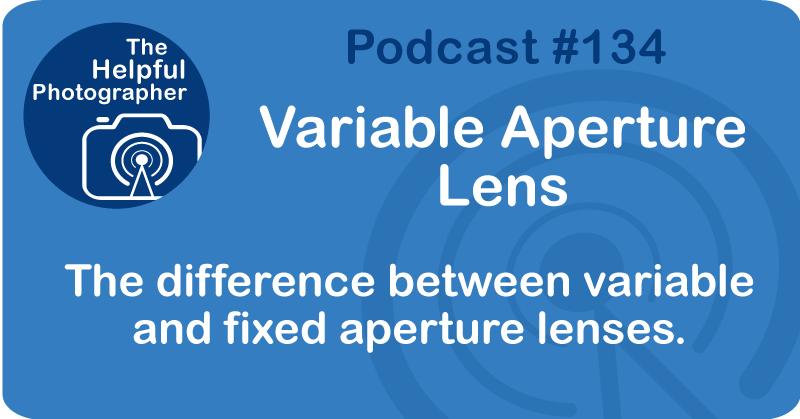Variable Aperture Lens #134

This podcast is for Gabrielle in Arizona. Hey dude, hope you're enjoying your new mirrorless. Even though the difference between a prime lens and a zoom lens is obvious, one only has one focal length while the other is variable, there is often another difference between the two. Due to the fact that the prime lens only does one thing, they are often able to gather more light, and hence you can get a much wider aperture opening. Because zoom lenses have to do a lot more, they are often slower offering less light-gathering capabilities. And when you can get a zoom lens that will open to an F 2.8 or even F 2.0, they're rather large, heavy, and expensive. This is where a variable aperture zoom lens comes in. You'll know whether or not you have a variable F-stop zoom lens by looking at the front of the lens. If you see the number one colon and then 2.8 or 4.0, you have a fixed aperture lens. On the other hand, if there are two numbers after the colon with a dash in the middle, you have a variable aperture lens. What this means is that as you zoom in closer to a subject, you will lose light and will not be able to maintain the same aperture, hence variable. Let's say you have a 55 to 200 millimeter lens, and it says one colon four dash 5.6. What that means is that when you are zoomed all the way out to 55 millimeters, you'll be able to open your aperture to f4.0. But as you zoom into 250, you'll only be able to open the aperture to f5.6. You have effectively lost one full stop of light. On the other hand, if you have a fixed aperture, let's say an f2.8, it means you'll be able to open your aperture to f2.8 no matter where you are in your zoom.
The difference between a fixed and variable aperture can be 50 to 100% more in price and 40 to 200% more in weight and size, which indicates that the one extra stop of light is extremely difficult to deliver. So before anyone pooh-poos that one extra stop of light, you need to consider what it takes to deliver it and why it's so important. I have always been a proponent of fast f2.8 fixed aperture lenses, but at this point in my life, the wait is starting to really get to me. So for the first time, I will not have a 2.8 lens in my bag at all.
Although it's nice to say that you want fast lenses, there's the reality of having to carry it day in and day out. In the next episode, I'll talk about focus limit switches. Don't know what that is? Tune in and find out. I hope that was helpful. Until next time, keep on shooting.











